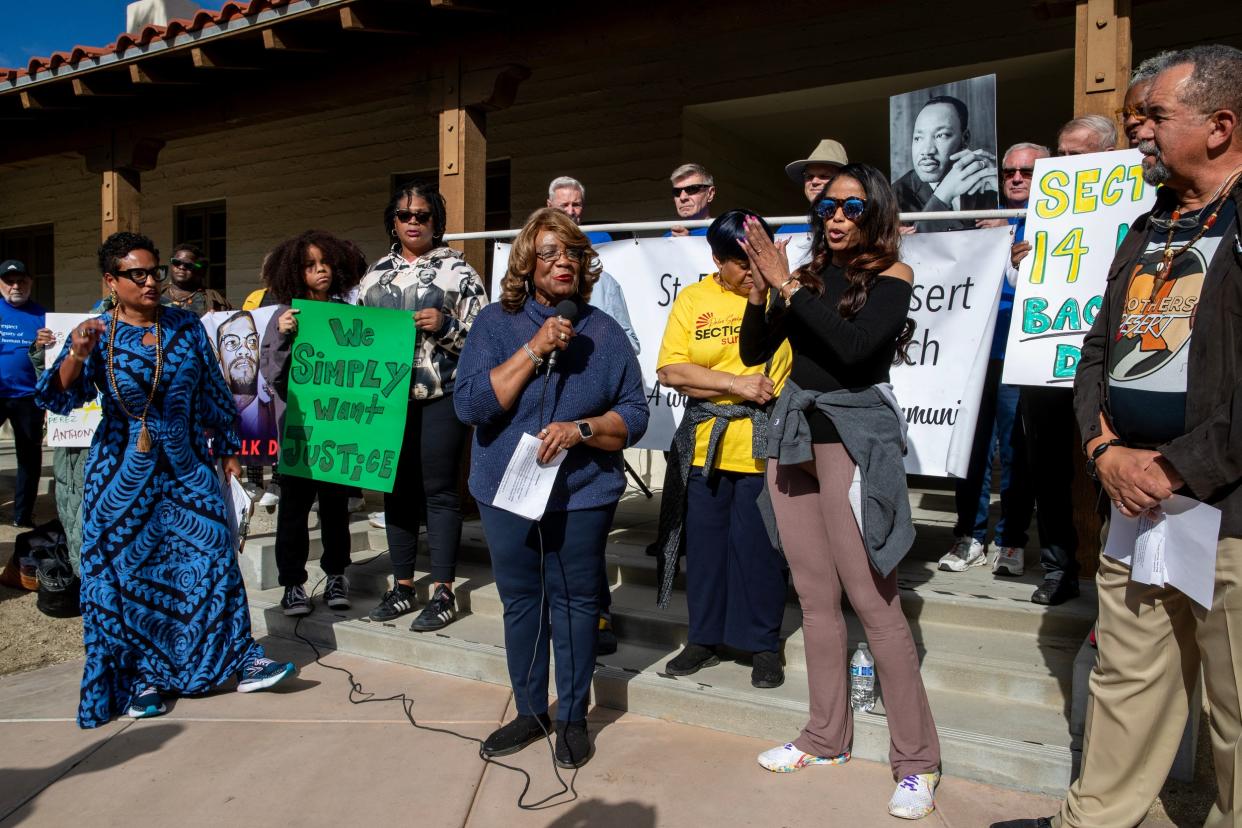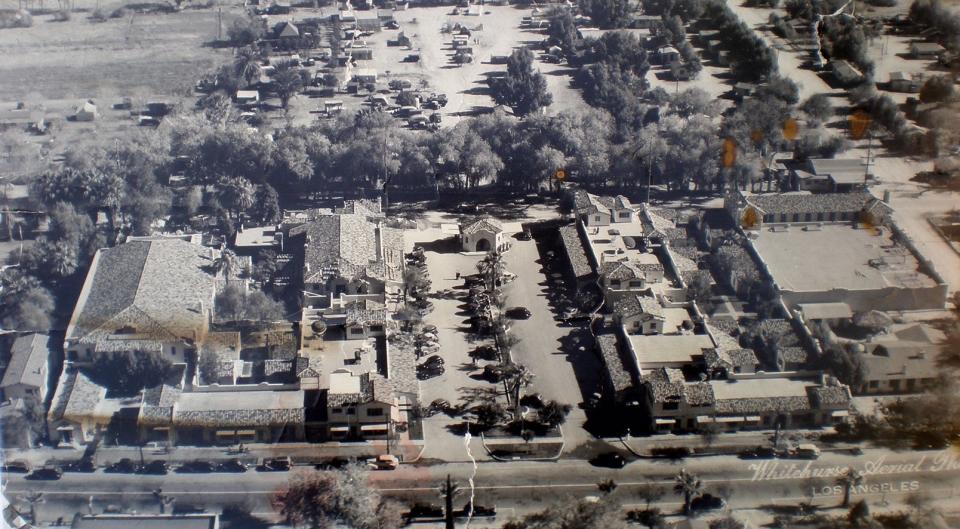Section 14 group rejects city of Palm Springs' settlement offer; negotiations to continue

A group of families that used to live in Palm Springs' Section 14 area has rejected the city's offer of $4.3 million to settle a legal claim over the city's role in the clearing of residents and homes more than 50 years ago.
“This offer is a first step, but the survivors and descendants are continuing to meet with the city and negotiations continue,” Areva Martin, the attorney for the group Section 14 Survivors, said in a statement provided to The Desert Sun. “The survivors look forward to working collaboratively with the City of Palm Springs to reach a fair resolution.”
Under the offer approved by the city council following a closed-door discussion last week, the city would pay about $29,494.81 each, or a total of about $4.3 million, to up to 145 households as compensation for what Mayor Jeffrey Bernstein said was the city’s wrongful role in demolishing up to 145 houses on Section 14.
On the same day it approved that offer, April 11, the council announced it was committing to several steps to address the harm that occurred on Section 14, including putting an unspecified amount of money into a land trust to fund affordable housing construction and exploring the feasibility of building a racial healing center in the city.
A spokesperson for the survivors group said Tuesday that it is still “looking to reach a targeted, fair resolution with the city,” although she declined to cite what specific terms the group would agree to.
However, the settlement offer emailed to Martin by City Attorney Jeffrey Ballinger states that Martin had previously proposed the city pay between $187.25 million and $365.75 million, to be split between families that lived in up to 350 homes that Martin's clients allege the city had a hand in destroying.
The initial claim submitted to the city also did not cite a specific amount sought but said instead that the harm caused by the city was estimated to be “upwards to $2 billion.”
What is Section 14?

Section 14 is a one-square-mile section of land adjacent to downtown Palm Springs owned by members of the Agua Caliente Band of Cahuilla Indians. For decades, many people of color either rented or built their own homes there, in part because racist housing policies denied them the ability to buy homes elsewhere in the city.
The clearing of the land followed federal decisions allowing tribal members to enter into long-term leases that for the first time made possible business and residential development on land they owned.
The clearing also followed years of debate about how to respond to poor living conditions in parts of Section 14, including lack of trash service or adequate water supply. Two women who lived in the area as children told The Desert Sun for a 2016 article that there was wide disparity in living conditions, with some people in safe, well-built houses like their family's and other people in trailers or shacks. Some of the homes were ultimately declared unsafe and destroyed.
While there is widespread agreement that the city oversaw and initially paid for some burnings and demolitions of homes, some in the city — including members of a group called Friends of Frank Bogert — have disputed that the city did anything wrong.
They say the historical record shows that the city provided resources for the demolitions at the behest of the tribe, required that homes only be destroyed after the city was provided proof that eviction notices had been served and that the city was reimbursed for the demolitions and burnings by the federal government.
The Friends of Frank Bogert group, named after the man who was mayor from 1958 to 1966, was formed amid controversy over his legacy as the city's leader during the clearing of Section 14. In 2021, the city council voted to begin the process of removing Bogert's statue from city hall grounds, and it was removed in mid-2022.
The Section 14 Survivors group's legal claim and other criticism of the city's actions have cited in part a 1968 report written by a California deputy attorney general that called the clearing of Section 14 a “city-engineered holocaust,” though it also found the city had not done anything illegal. However, others say the credibility of that report was called into question last year when the city released new documents from the period that contradicted several of the report’s conclusions, including the allegation that the city kept no records of the evictions.
Emails show tense negotiations
With the group apparently unwilling to agree to the city’s offer and planning to continue negotiations, it is not clear what will happen next. The city had not responded to questions from The Desert Sun about next steps as of Thursday afternoon.
However, the decision to make the settlement offer itself represented a change in course for the council, which had previously said in public comments for months that it would not move forward with attempting to settle the claim until a historical consultant had completed research into Section 14.
Bernstein said last week that the council has recommitted to hiring a consultant to research the history of Section 14. However, the council has not said why it changed course to extend the offer before hiring the consultant or how it ended up determining that the city had acted wrongfully without completing the factfinding process it had insisted was necessary for months.
Bernstein, however, said he would address those and other questions posed by The Desert Sun related to the process later this week.
While the claim remains open and next steps uncertain, the city has released several emails between Ballinger and Martin in response to The Desert Sun's public records request. Those exchanges provide insight into the months of discussions that preceded the city’s offer.
The emails show the attorneys clashing over several issues, including whether verification of the history of Section 14 was still needed.
In one exchange in July, Martin said no historical research is needed because a 2021 Palm Springs Human Rights Commission report already concluded the city had acted wrongfully. However, Ballinger responded that the report had not been commissioned or formally adopted by the council.
At other points, Ballinger rejected ideas proposed by Martin, saying taking the dispute to mediation or arbitration was premature without a “more fully developed factual background” and that a proposal to designate a former Section 14 resident, or a descendant of one, as a city council member would be illegal.
When Ballinger noted council plans for business development, a health clinic and new housing to benefit the city's north end, where many former Section 14 residents or descendants live, Martin replied that they were steps the city should be taking anyway and inadequate to settle the legal claim.
The emails also show the sometimes tense nature of the discussions. In one message, Ballinger wrote that since attorneys became involved in the discussion around reparations, “the tone and tenor of the Section 14 discussion has taken a marked turn toward a more adversarial approach.” In another email from October, Martin responded to a request by Ballinger to “come to the table in a spirit of collaboration, rather than litigation” by writing “how dare the city now claim that we are not acting in good faith and we should somehow dismiss the claim, and trust the city to act in good faith."
She also said: “If I didn’t know you better, I would think you were trying to gaslight me!”
Paul Albani-Burgio covers growth, development and business in the Coachella Valley. Follow him on Twitter at @albaniburgiop and email him at paul.albani-burgio@desertsun.com.
This article originally appeared on Palm Springs Desert Sun: Section 14 group rejects Palm Springs' $4.3 million settlement offer

